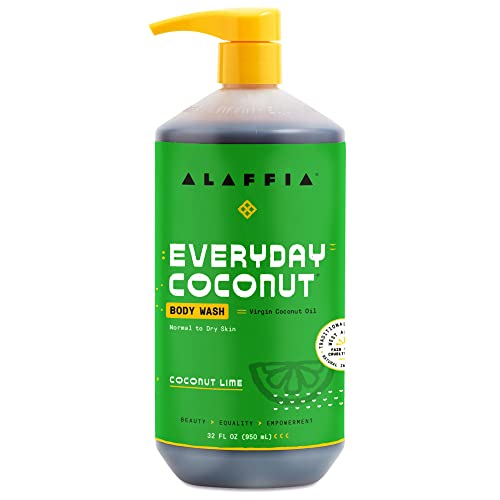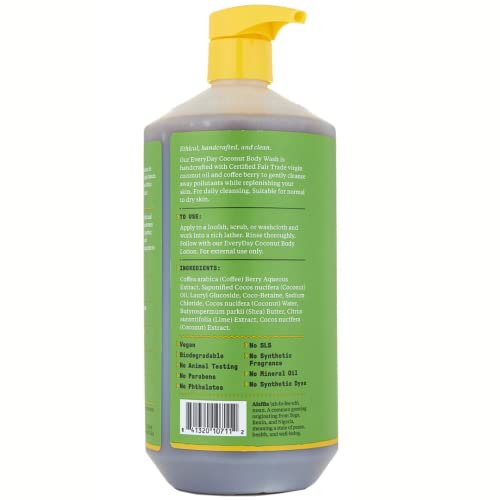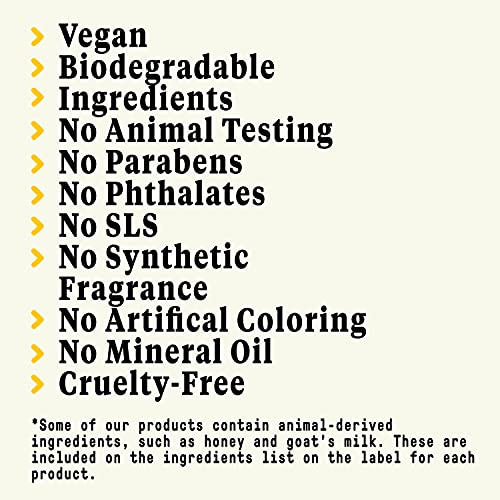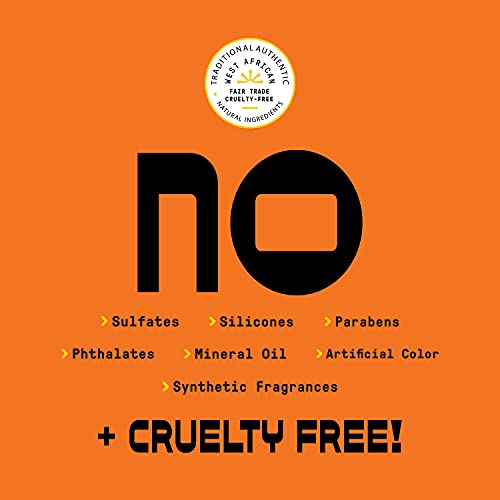




Alaffia EveryDay Coconut Body Wash - Hydrating Cleanse for Normal to Dry Skin, Fair Trade - 32 Fl Oz


Cocamidopropyl Betaine
High RiskCocamidopropyl betaine is a synthetic surfactant derived from coconut oil, commonly used in personal care products for its mild cleansing and foaming properties. It functions as a surfactant, emulsifier, and thickening agent, contributing to the texture and performance of formulations.
Sustai Insights
Cocamidopropyl betaine offers functional benefits as a gentle surfactant, enhancing product foaming and texture. However, it may pose low to moderate allergenic risks and is subject to high use restrictions due to contamination concerns. Regulatory bodies have advised on its safe levels of usage, categorizing its risk level as high overall. Users should practice caution, particularly with sensitive populations, and consider alternatives like naturally derived surfactants for safer formulations.
Lauryl Glucoside
Low RiskLauryl glucoside is a sugar- and lipid-based surfactant commonly used in personal care products. It functions as a mild cleanser and emulsifier, helping to solubilize oils and dirt while contributing to product texture and stability.
Sustai Insights
Lauryl glucoside offers functional benefits as a gentle surfactant that effectively cleanses without harshness, and it is biodegradable, indicating sustainable sourcing. Health risks are minimal, with low concerns for carcinogenicity and low to moderate potential for irritation or allergies. Environmental risks are also low, with no significant pollutant or bioaccumulation concerns. Regulatory bodies have not issued specific warnings. Overall, it is assessed as low risk, suitable for use in various formulations, making it a viable option for those seeking safer alternatives.
Cocos Nucifera (Coconut) Water
Low RiskCocos Nucifera (coconut) water is an aqueous extract derived from the fruit of the coconut palm. It is commonly used in cosmetic and personal care products for its hydrating and soothing properties. Coconut water is rich in electrolytes and nutrients, making it a popular ingredient in formulations aimed at hydration.
Sustai Insights
Coconut water provides effective hydration and possesses antioxidant properties, contributing to skin health. It is sustainably sourced and biodegradable, enhancing its environmental profile. Health risks are minimal, with low concerns for carcinogenicity, allergies, or reproductive toxicity. Regulatory bodies do not impose significant restrictions on its use, marking it as a low-risk ingredient. Safe usage practices recommend using it in formulations designed for topical application, with alternatives including aloe vera for similar hydration benefits.
Coffea Arabica (Arabian Coffee) Extract
Low RiskCoffea arabica (coffee) extract is an extract derived from the seeds of the Coffea arabica plant. It is commonly used in cosmetic and personal care products for its antioxidant properties and ability to enhance the sensory experience of formulations.
Sustai Insights
Coffea arabica extract offers functional benefits such as antioxidant properties and skin conditioning. It is not currently associated with significant health risks, as concerns regarding carcinogenicity, allergies, and reproductive toxicity are low. Environmentally, it poses minimal risk, with no significant pollutant or bioaccumulation concerns. Regulatory bodies have not issued restrictions on its use. Overall, the risk level associated with this ingredient is low, making it a safe choice for formulation. Alternatives may include other plant extracts with similar benefits.
Cocos Nucifera Fruit Extract
Low RiskCocos Nucifera Fruit Extract is an extract derived from the fruit of the coconut palm, commonly used in cosmetic formulations for its moisturizing properties. It serves primarily as a skin conditioning agent, contributing to product texture and hydration.
Sustai Insights
Cocos Nucifera Fruit Extract offers functional benefits such as effective skin hydration and conditioning, with sustainable sourcing potential. Scientific assessments indicate low health risks, including minimal concerns for carcinogenicity, allergies, and reproductive toxicity. Environmental impacts are also low, with no significant bioaccumulation or pollution concerns. Regulatory bodies do not impose restrictions on its use, leading to an overall low-risk classification. Safe usage practices include patch testing for sensitive individuals. Alternatives like shea butter or other plant-based extracts may be considered for similar benefits.
Hydrogenated Coconut Oil
Low RiskHydrogenated coconut oil is an end product of the hydrogenation process, where coconut oil is chemically altered to enhance its stability and shelf-life. It serves primarily as an emollient and thickening agent in cosmetic formulations, providing a smooth texture and moisturizing properties.
Sustai Insights
Hydrogenated coconut oil offers functional benefits as a moisturizing agent and stabilizer in formulations. It is generally recognized as safe with low risks for cancer, allergies, and reproductive toxicity, according to the Cosmetic Ingredient Review (CIR). Environmental impacts are minimal, with no significant pollutant potential. Regulatory bodies have not issued advisories against its use. Overall, the ingredient presents a low risk profile, making it a suitable choice in cosmetic products. For those seeking alternatives, natural oils or non-hydrogenated variants may be considered.
Hydrogenated Coconut Oil
Low RiskHydrogenated coconut oil is an end product of the hydrogenation process, where coconut oil is chemically altered to enhance its stability and shelf-life. It serves primarily as an emollient and thickening agent in cosmetic formulations, providing a smooth texture and moisturizing properties.
Sustai Insights
Hydrogenated coconut oil offers functional benefits as a moisturizing agent and stabilizer in formulations. It is generally recognized as safe with low risks for cancer, allergies, and reproductive toxicity, according to the Cosmetic Ingredient Review (CIR). Environmental impacts are minimal, with no significant pollutant potential. Regulatory bodies have not issued advisories against its use. Overall, the ingredient presents a low risk profile, making it a suitable choice in cosmetic products. For those seeking alternatives, natural oils or non-hydrogenated variants may be considered.
Hydrogenated Coconut Oil
Low RiskHydrogenated coconut oil is an end product of the hydrogenation process, where coconut oil is chemically altered to enhance its stability and shelf-life. It serves primarily as an emollient and thickening agent in cosmetic formulations, providing a smooth texture and moisturizing properties.
Sustai Insights
Hydrogenated coconut oil offers functional benefits as a moisturizing agent and stabilizer in formulations. It is generally recognized as safe with low risks for cancer, allergies, and reproductive toxicity, according to the Cosmetic Ingredient Review (CIR). Environmental impacts are minimal, with no significant pollutant potential. Regulatory bodies have not issued advisories against its use. Overall, the ingredient presents a low risk profile, making it a suitable choice in cosmetic products. For those seeking alternatives, natural oils or non-hydrogenated variants may be considered.
Citrus Aurantifolia (Lime) Fruit Extract
Low RiskCitrus aurantifolia (lime) fruit extract is derived from the fruit of the lime tree. It is commonly used in cosmetic formulations for its aromatic properties and potential skin benefits, often included for fragrance or as a natural preservative due to its antioxidant content.
Sustai Insights
Citrus aurantifolia (lime) fruit extract offers functional benefits, including antioxidant properties and a refreshing scent, contributing to product appeal. It has a low risk profile concerning health impacts, with minimal concerns for carcinogenicity, allergies, or reproductive toxicity. Environmental risks are also low, as it is not known to be a pollutant or bioaccumulative. Regulatory status indicates that it is allowed in cosmetics with no specific restrictions. Overall, safe usage practices should be followed, and while alternatives exist, they may not replicate all benefits. Thus, the overall risk assessment is low.
Sodium Chloride
Low RiskSodium chloride is an inorganic salt commonly known as table salt. It is primarily used in food preservation and flavor enhancement, as well as in various industrial applications. It exists as a crystalline solid and dissolves easily in water, making it effective for diverse uses in food products and other formulations.
Sustai Insights
Sodium chloride serves essential functions in food preservation and flavor enhancement. It is considered safe with low health risks related to cancer, allergies, and reproductive toxicity. Environmental concerns are minimal, as it does not bioaccumulate and poses low pollutant potential. Regulatory bodies, including the FDA, recognize its safety for consumption. Overall, sodium chloride carries a low risk profile, making it a widely accepted ingredient in food and cosmetic products.
Butyrospermum Parkii (Shea) Butter
Low RiskButyrospermum parkii (shea) butter is a vegetable fat derived from the nuts of the shea tree. It is commonly used in cosmetic formulations for its emollient properties, providing moisture and improving skin texture. Additionally, shea butter is known for its ability to enhance the stability of products and deliver a creamy texture.
Sustai Insights
Shea butter offers functional benefits as an effective moisturizer, enhancing skin barrier function and texture. It is sustainably sourced and biodegradable, contributing to eco-friendliness. Health-wise, it is associated with low risks for carcinogenicity, allergies, and reproductive toxicity. Environmental impacts are minimal, with no significant pollutant potential identified. Regulatory assessments indicate no current restrictions. Overall, the ingredient presents a low risk, making it a favorable choice in cosmetic formulations.
Lauryl Glucoside
Low RiskLauryl glucoside is a sugar- and lipid-based surfactant commonly used in personal care products. It functions as a mild cleanser and emulsifier, helping to solubilize oils and dirt while contributing to product texture and stability.
Sustai Insights
Lauryl glucoside offers functional benefits as a gentle surfactant that effectively cleanses without harshness, and it is biodegradable, indicating sustainable sourcing. Health risks are minimal, with low concerns for carcinogenicity and low to moderate potential for irritation or allergies. Environmental risks are also low, with no significant pollutant or bioaccumulation concerns. Regulatory bodies have not issued specific warnings. Overall, it is assessed as low risk, suitable for use in various formulations, making it a viable option for those seeking safer alternatives.
Cocos Nucifera (Coconut) Water
Low RiskCocos Nucifera (coconut) water is an aqueous extract derived from the fruit of the coconut palm. It is commonly used in cosmetic and personal care products for its hydrating and soothing properties. Coconut water is rich in electrolytes and nutrients, making it a popular ingredient in formulations aimed at hydration.
Sustai Insights
Coconut water provides effective hydration and possesses antioxidant properties, contributing to skin health. It is sustainably sourced and biodegradable, enhancing its environmental profile. Health risks are minimal, with low concerns for carcinogenicity, allergies, or reproductive toxicity. Regulatory bodies do not impose significant restrictions on its use, marking it as a low-risk ingredient. Safe usage practices recommend using it in formulations designed for topical application, with alternatives including aloe vera for similar hydration benefits.
Coffea Arabica (Arabian Coffee) Extract
Low RiskCoffea arabica (coffee) extract is an extract derived from the seeds of the Coffea arabica plant. It is commonly used in cosmetic and personal care products for its antioxidant properties and ability to enhance the sensory experience of formulations.
Sustai Insights
Coffea arabica extract offers functional benefits such as antioxidant properties and skin conditioning. It is not currently associated with significant health risks, as concerns regarding carcinogenicity, allergies, and reproductive toxicity are low. Environmentally, it poses minimal risk, with no significant pollutant or bioaccumulation concerns. Regulatory bodies have not issued restrictions on its use. Overall, the risk level associated with this ingredient is low, making it a safe choice for formulation. Alternatives may include other plant extracts with similar benefits.
Cocos Nucifera Fruit Extract
Low RiskCocos Nucifera Fruit Extract is an extract derived from the fruit of the coconut palm, commonly used in cosmetic formulations for its moisturizing properties. It serves primarily as a skin conditioning agent, contributing to product texture and hydration.
Sustai Insights
Cocos Nucifera Fruit Extract offers functional benefits such as effective skin hydration and conditioning, with sustainable sourcing potential. Scientific assessments indicate low health risks, including minimal concerns for carcinogenicity, allergies, and reproductive toxicity. Environmental impacts are also low, with no significant bioaccumulation or pollution concerns. Regulatory bodies do not impose restrictions on its use, leading to an overall low-risk classification. Safe usage practices include patch testing for sensitive individuals. Alternatives like shea butter or other plant-based extracts may be considered for similar benefits.
Hydrogenated Coconut Oil
Low RiskHydrogenated coconut oil is an end product of the hydrogenation process, where coconut oil is chemically altered to enhance its stability and shelf-life. It serves primarily as an emollient and thickening agent in cosmetic formulations, providing a smooth texture and moisturizing properties.
Sustai Insights
Hydrogenated coconut oil offers functional benefits as a moisturizing agent and stabilizer in formulations. It is generally recognized as safe with low risks for cancer, allergies, and reproductive toxicity, according to the Cosmetic Ingredient Review (CIR). Environmental impacts are minimal, with no significant pollutant potential. Regulatory bodies have not issued advisories against its use. Overall, the ingredient presents a low risk profile, making it a suitable choice in cosmetic products. For those seeking alternatives, natural oils or non-hydrogenated variants may be considered.
Hydrogenated Coconut Oil
Low RiskHydrogenated coconut oil is an end product of the hydrogenation process, where coconut oil is chemically altered to enhance its stability and shelf-life. It serves primarily as an emollient and thickening agent in cosmetic formulations, providing a smooth texture and moisturizing properties.
Sustai Insights
Hydrogenated coconut oil offers functional benefits as a moisturizing agent and stabilizer in formulations. It is generally recognized as safe with low risks for cancer, allergies, and reproductive toxicity, according to the Cosmetic Ingredient Review (CIR). Environmental impacts are minimal, with no significant pollutant potential. Regulatory bodies have not issued advisories against its use. Overall, the ingredient presents a low risk profile, making it a suitable choice in cosmetic products. For those seeking alternatives, natural oils or non-hydrogenated variants may be considered.
Hydrogenated Coconut Oil
Low RiskHydrogenated coconut oil is an end product of the hydrogenation process, where coconut oil is chemically altered to enhance its stability and shelf-life. It serves primarily as an emollient and thickening agent in cosmetic formulations, providing a smooth texture and moisturizing properties.
Sustai Insights
Hydrogenated coconut oil offers functional benefits as a moisturizing agent and stabilizer in formulations. It is generally recognized as safe with low risks for cancer, allergies, and reproductive toxicity, according to the Cosmetic Ingredient Review (CIR). Environmental impacts are minimal, with no significant pollutant potential. Regulatory bodies have not issued advisories against its use. Overall, the ingredient presents a low risk profile, making it a suitable choice in cosmetic products. For those seeking alternatives, natural oils or non-hydrogenated variants may be considered.
Citrus Aurantifolia (Lime) Fruit Extract
Low RiskCitrus aurantifolia (lime) fruit extract is derived from the fruit of the lime tree. It is commonly used in cosmetic formulations for its aromatic properties and potential skin benefits, often included for fragrance or as a natural preservative due to its antioxidant content.
Sustai Insights
Citrus aurantifolia (lime) fruit extract offers functional benefits, including antioxidant properties and a refreshing scent, contributing to product appeal. It has a low risk profile concerning health impacts, with minimal concerns for carcinogenicity, allergies, or reproductive toxicity. Environmental risks are also low, as it is not known to be a pollutant or bioaccumulative. Regulatory status indicates that it is allowed in cosmetics with no specific restrictions. Overall, safe usage practices should be followed, and while alternatives exist, they may not replicate all benefits. Thus, the overall risk assessment is low.
Sodium Chloride
Low RiskSodium chloride is an inorganic salt commonly known as table salt. It is primarily used in food preservation and flavor enhancement, as well as in various industrial applications. It exists as a crystalline solid and dissolves easily in water, making it effective for diverse uses in food products and other formulations.
Sustai Insights
Sodium chloride serves essential functions in food preservation and flavor enhancement. It is considered safe with low health risks related to cancer, allergies, and reproductive toxicity. Environmental concerns are minimal, as it does not bioaccumulate and poses low pollutant potential. Regulatory bodies, including the FDA, recognize its safety for consumption. Overall, sodium chloride carries a low risk profile, making it a widely accepted ingredient in food and cosmetic products.
Cocamidopropyl Betaine
High RiskCocamidopropyl betaine is a synthetic surfactant derived from coconut oil, commonly used in personal care products for its mild cleansing and foaming properties. It functions as a surfactant, emulsifier, and thickening agent, contributing to the texture and performance of formulations.
Sustai Insights
Cocamidopropyl betaine offers functional benefits as a gentle surfactant, enhancing product foaming and texture. However, it may pose low to moderate allergenic risks and is subject to high use restrictions due to contamination concerns. Regulatory bodies have advised on its safe levels of usage, categorizing its risk level as high overall. Users should practice caution, particularly with sensitive populations, and consider alternatives like naturally derived surfactants for safer formulations.
Butyrospermum Parkii (Shea) Butter
Low RiskButyrospermum parkii (shea) butter is a vegetable fat derived from the nuts of the shea tree. It is commonly used in cosmetic formulations for its emollient properties, providing moisture and improving skin texture. Additionally, shea butter is known for its ability to enhance the stability of products and deliver a creamy texture.
Sustai Insights
Shea butter offers functional benefits as an effective moisturizer, enhancing skin barrier function and texture. It is sustainably sourced and biodegradable, contributing to eco-friendliness. Health-wise, it is associated with low risks for carcinogenicity, allergies, and reproductive toxicity. Environmental impacts are minimal, with no significant pollutant potential identified. Regulatory assessments indicate no current restrictions. Overall, the ingredient presents a low risk, making it a favorable choice in cosmetic formulations.
Experience the refreshing cleanse of Alaffia EveryDay Coconut Body Wash, designed for normal to dry skin. This sulfate-free formula combines fair-trade virgin coconut oil and coffee berry extract, ensuring a gentle yet effective wash that hydrates while removing toxins and grime.
- Gentle Hydration: This body wash replenishes moisture, leaving skin soft and nourished after every use.
- Refreshing Scent: Enjoy the delightful blend of creamy coconut and zesty lime, transforming your daily shower into a tropical escape.
- Fair Trade Commitment: By choosing Alaffia, you support women-led cooperatives in West Africa, promoting sustainable practices and community development.
- Clean Ingredients: Formulated without sulfates, parabens, or synthetic fragrances, this body wash is safe for your skin and the environment.
- Versatile Use: Perfect for everyday cleansing, it can also double as a hand wash, making it a practical addition to your personal care routine.
Subscribe & Save with Sustai
- Best Price Guarantee: Always enjoy the lowest prices on sustainable home essentials.
- No Surprises: We’ll notify you before shipping. No hidden fees, ever.
- You’re in Charge: Change, pause, or cancel your subscription anytime with ease.
- Eco-Friendly Deliveries: Our grouped shipments mean less packaging and lower emissions.
Join us on a sustainable journey. Special offers for a limited time! Prices and promotions may change.
Recommended Products
Experience the refreshing cleanse of Alaffia EveryDay Coconut Body Wash, designed for normal to dry skin. This sulfate-free formula combines fair-trade virgin coconut oil and coffee berry extract, ensuring a gentle yet effective wash that hydrates while removing toxins and grime.
- Gentle Hydration: This body wash replenishes moisture, leaving skin soft and nourished after every use.
- Refreshing Scent: Enjoy the delightful blend of creamy coconut and zesty lime, transforming your daily shower into a tropical escape.
- Fair Trade Commitment: By choosing Alaffia, you support women-led cooperatives in West Africa, promoting sustainable practices and community development.
- Clean Ingredients: Formulated without sulfates, parabens, or synthetic fragrances, this body wash is safe for your skin and the environment.
- Versatile Use: Perfect for everyday cleansing, it can also double as a hand wash, making it a practical addition to your personal care routine.

You can have at most 2 Sustainable Steals products in your cart
Customer Reviews
Customers’ View
Customers generally appreciate the gentle cleansing and moisturizing properties of this body wash, highlighting its effectiveness for normal to dry skin. Many users report that it leaves their skin feeling fresh and hydrated without causing irritation, with comments such as it 'cleans without over drying.' The product's natural and chemical-free formulation resonates well with health-conscious consumers, as it contains fair-trade virgin coconut oil and antioxidants. However, some customers have expressed concerns regarding the product's texture, noting it can be runny and may leak from the packaging. Additionally, opinions on the scent vary, with some enjoying the light coconut lime fragrance while others find it less appealing. Overall, customers find value in a product that aligns with sustainable and health-oriented choices.
AI-generated from the text of customer reviewsThis product is rated 3.0 of 5.0 stars.
It has received 1 review.




